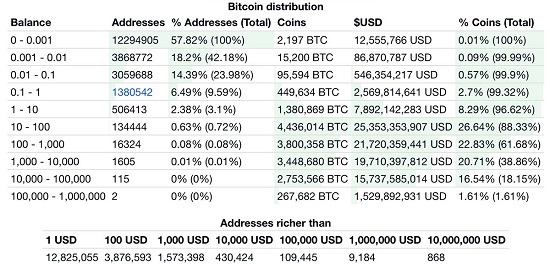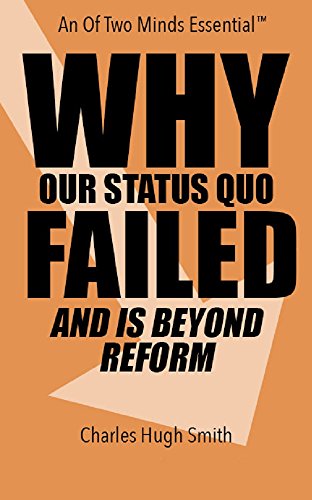Summary:
If the ownership of bitcoin is as concentrated as some estimate, then the liquidity issue distills down to the actions of the top tier of owners. Whenever I raise the topic of bitcoin and cryptocurrencies, I feel like an agnostic in the 30 Years War between Catholics and Protestants. There is precious little neutral ground in the crypto-is-a-bubble battle; one side is absolutely confident that bitcoin and the other cryptocurrencies are in a tulip-bulb type bubble, while the other camp is equally confident that we ain’t seen nuthin’ yet in terms of bitcoin’s future valuation. I’ve stated here more than once that in my view the real value of bitcoin will only be revealed in a financial/market crisis/crash like
Topics:
Charles Hugh Smith considers the following as important: Bitcoin, Featured, Gold, newsletter
This could be interesting, too:
If the ownership of bitcoin is as concentrated as some estimate, then the liquidity issue distills down to the actions of the top tier of owners. Whenever I raise the topic of bitcoin and cryptocurrencies, I feel like an agnostic in the 30 Years War between Catholics and Protestants. There is precious little neutral ground in the crypto-is-a-bubble battle; one side is absolutely confident that bitcoin and the other cryptocurrencies are in a tulip-bulb type bubble, while the other camp is equally confident that we ain’t seen nuthin’ yet in terms of bitcoin’s future valuation. I’ve stated here more than once that in my view the real value of bitcoin will only be revealed in a financial/market crisis/crash like
Topics:
Charles Hugh Smith considers the following as important: Bitcoin, Featured, Gold, newsletter
This could be interesting, too:
investrends.ch writes Welche Rolle spielen gehebelte Produkte beim jüngsten Einbruch der Krypto-Währungen?
investrends.ch writes «Die Nerven liegen derzeit blank»
investrends.ch writes Bitcoin fällt unter 90 000 US-Dollar
investrends.ch writes Bitcoin zieht deutlich an
If the ownership of bitcoin is as concentrated as some estimate, then the liquidity issue distills down to the actions of the top tier of owners.
Whenever I raise the topic of bitcoin and cryptocurrencies, I feel like an agnostic in the 30 Years War between Catholics and Protestants. There is precious little neutral ground in the crypto-is-a-bubble battle; one side is absolutely confident that bitcoin and the other cryptocurrencies are in a tulip-bulb type bubble, while the other camp is equally confident that we ain’t seen nuthin’ yet in terms of bitcoin’s future valuation.
I’ve stated here more than once that in my view the real value of bitcoin will only be revealed in a financial/market crisis/crash like 2008-09. Longtime correspondent Mark G. recently proposed three tests that illuminate some of the dynamics that might come into play in the next financial/market crash/crisis.
(CHS NOTE: gold fell from a peak around $1,100 per ounce in March 2008 to $830 in October 2008. It then bounced back to $1,100 in February 2008. The standard explanation for the sharp decline was that gold was sold off to meet margin calls and other obligations arising from the Global Financial Meltdown of late 2008. That gold was perceived as a reliable store of value may have increased its attractiveness as an asset to sell in the mad scramble to raise cash.)
Here is Mark’s commentary:
I propose that the performance of gold in 2008-2009 offers an indicator into how bitcoin is likely to behave.
I propose three practical tests for bitcoin.
Test 1. Is it possible to meet any sort of ‘margin call’ using bitcoin directly? Is it possible to do so on a large enough scale to affect market liquidity in any particular market? i.e. are any margin loans or the functional equivalent thereof denominated in bitcoin? In 2008 as “margin calls” flowed in from everywhere, all speculative assets experienced the same selling pressure to raise cash to meet obligations denominated in “money”.
Test 2. Can the physical necessities of daily life be commonly paid for directly and locally using bitcoin? I mean things like food, fuel, medicine, clothing and local debts for utilities, taxes, rents and mortgages. Or is it necessary to first exchange one’s bitcoin for ‘legal tender’ to conduct these transactions?
Test 3. Can bitcoin even be used to financially sustain bitcoin’s minimum physical infrastructure of servers, brokers and trading desks? Can it pay leases, electric bills and purchase the servers required for this?
Are there any lenders of “last resort” ready, willing and able to sustain bitcoin banks, traders and speculators? If not, and precisely because there is a limited supply of bitcoin, it seems a certainty that the financial failures previously seen in the decades prior to the Federal Reserve Act are likely to recur in the bitcoin infrastructure for precisely the same reason: liquidity crunches appearing.
These are precisely the tests that gold and silver failed in 2008/2009. And until bitcoin is ready to pass these tests I think it too will collapse in any future Global Financial Crisis.
Thank you, Mark. Liquidity is an issue in any financial crisis, as sellers may be unable to find buyers at any price. Bitcoin has two liquidity issues:
1. Will sellers of bitcoin find a bid from buyers if a flood of bitcoins hit the market as speculators sell assets to raise cash to meet margin calls (or simply book profits in volatile markets)?
2. Since bitcoin must generally be converted to local currencies to buy the supplies and pay the bills Mark listed above, liquidity must also include the convertibility of bitcoin to USD, euros, yen and yuan, that is, the willingness of traders to exchange USD, euros, yen and yuan for bitcoin.
A liquidity crunch has the potential to unleash a positive feedback loop (i.e. self-reinforcing feedback loop) in which the absence of liquidity triggers panic that then sparks more selling which then worsens the liquidity crunch which then increases panic selling, and so on.
|
Another potential factor is the ownership of bitcoin. The topic is complicated because one individual can own a number of exchange accounts, wallets and coins in cold storage. On the other hand, one address might represent more than one owner.
To further complicate matters, an unknown number of bitcoins have been lost, i.e. the keys have been lost in hard drive crashes and the like. There is no way to know the number of zombie bitcoins with any precision.
For this reason, charts of bitcoin distribution refer to addresses, not individuals.
|
Bitcoin Distribution(see more posts on Bitcoin, ) |
The acronym HODL pops up a lot in the crypto space: hold on for dear life, meaning hold on to your bitcoin, Ether, etc. through thick and thin rather than trade or sell it.
If the ownership of bitcoin is as concentrated as some estimate, then the liquidity issue distills down to the actions of the top tier of owners: if some substantial percentage of major owners are forced to liquidate their bitcoin to cover massive margin calls elsewhere in their financial holdings, the sale of big blocks could overwhelm buyers, creating a liquidity crunch.
If most of the major owners have eschewed debt and margin in favor of cash, bitcoin, gold, etc., then they might be in a position to provide liquidity as speculators dump bitcoin to raise cash or lock in gains.
Given the limited number of bitcoin available to trade, liquidity could dry up very quickly if major blocks are dumped on the market.
Given the strong views bitcoin arouses, it may come down to how many major owners will HODL in a panic-soaked financial crisis, how many will avoid being forced to liquidate their bitcoin holdings to meet margin calls or other obligations, and how many will have the wherewithal and the courage of their convictions to be buyers when volatility soars.
Put another way, beliefs and confidence can generate behaviors and decisions that may well appear irrational to speculators.
I don’t know how the market for bitcoin will react in a 2008-type crisis, but the small float of available coins practically guarantees high volatility. How it all shakes out a year after the crisis is another question that’s unanswerable.
My new book is #9 on Kindle short reads -> politics and social science For more, please visit the book's website.
Tags: Bitcoin,Featured,newsletter


